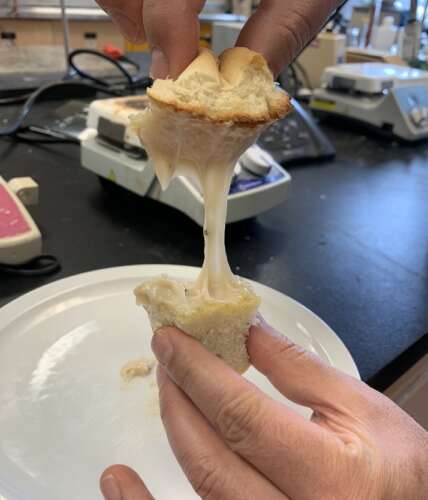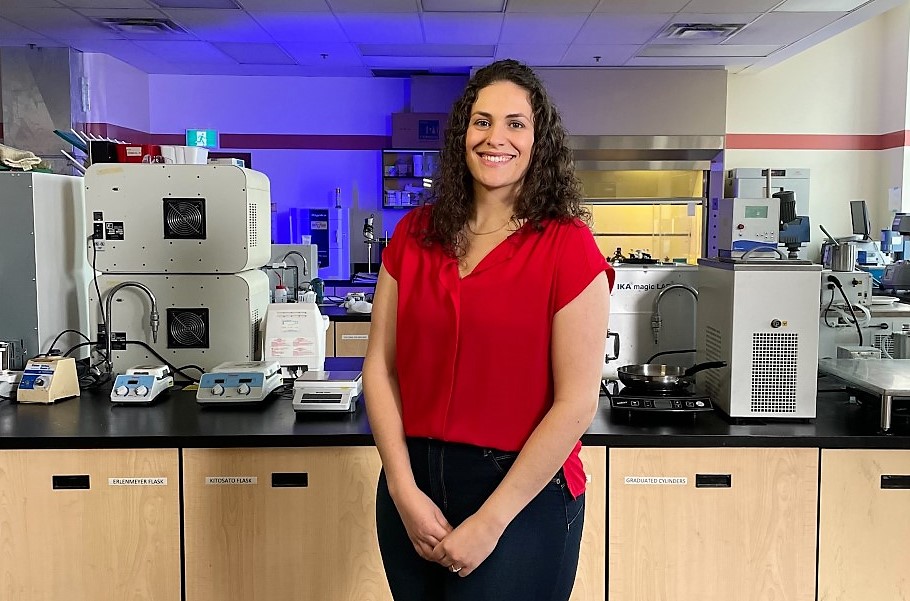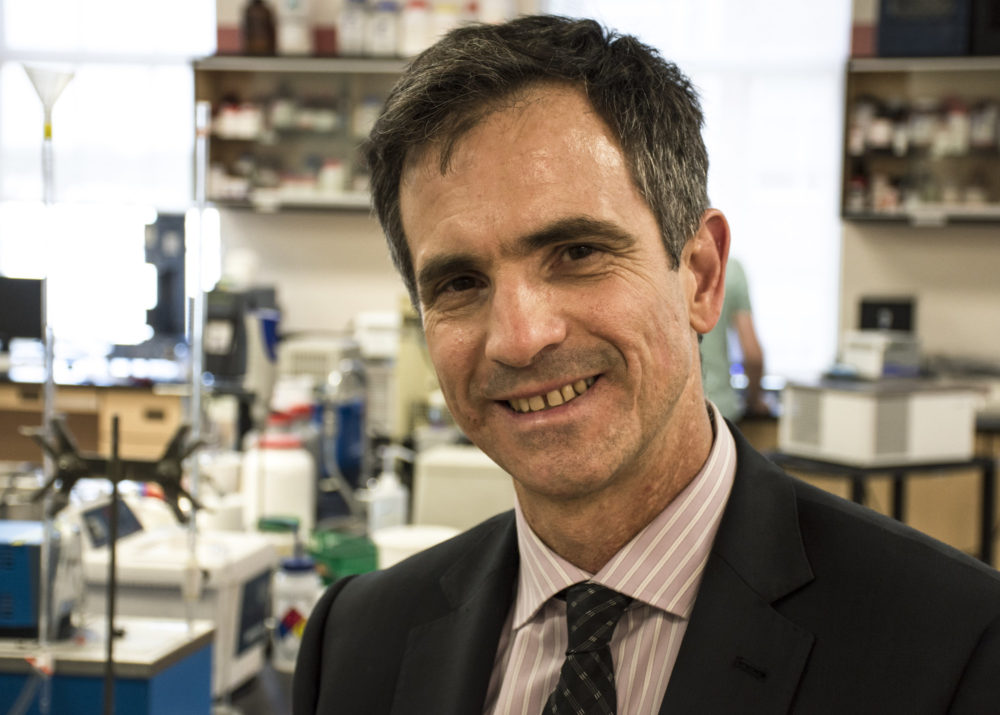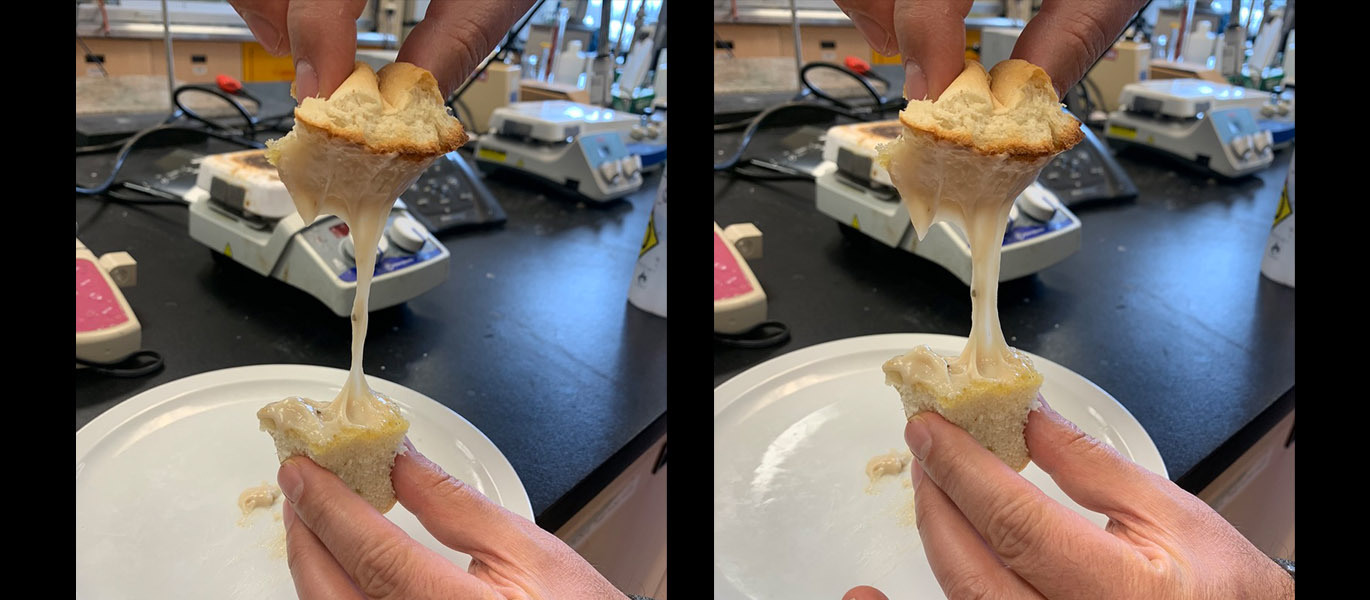Your pizza cheese needs to stretch just so, and your grilled cheese sandwich needs just the right amount of gooeyness – qualities that come naturally with traditional animal-based dairy products but not with plant-based cheeses.
As growing numbers of consumers look for more environmentally sustainable food alternatives, University of Guelph food science researchers in the Ontario Agricultural College are working to create the same appetizing qualities of dairy cheese in their plant-based counterparts.
In collaboration with a leading vegan cheese company, the researchers are mixing and matching plant proteins with the goal of developing sustainable versions of cheeses that stretch and spread and melt just as dairy-based products do.
Plant-based cheeses for varied markets

It’s a task that calls for food science smarts as well as sophisticated lab equipment at U of G and even an advanced imaging device at a dedicated research centre in Saskatoon, said Stacie Dobson, a PhD candidate working with Dr. Alejandro Marangoni in the Department of Food Science.
They are using those tools to test and ideally alter properties of various plant proteins to meet market needs. Referring to the lab group, she said, “We have been looking at introducing plant proteins into model cheese.”
The researchers have analyzed proteins in peas, soy, fava beans and other plant products and are looking for ways to tweak those components to work more like animal proteins in dairy cheeses.
“Think of a cheese that melts. You want it ooey and gooey and stretchy,” she said. “That functionality comes from how proteins and processing work. We want to use plant proteins to replicate a broad range of properties in dairy products.
“I might want to slice cheese for grilled cheese, or grate it for pizza, or spread it like cream cheese. The options are not as wide as in dairy cheese.”
Plant proteins pose challenges for cheese makers

Plant proteins work differently from animal proteins in cheeses and meats, said Dobson, who is also looking at improving plant-based meats.
Heat up dairy cheese and its proteins, notably casein, allow melting and stretching. “With plant proteins, that’s not how they work.” Proteins in beans or legumes come in different forms. “They’re not likely to aggregate or stretch. They have a more brittle structure.”
That’s why many of those desired qualities have generally eluded manufacturers experimenting with plant-based versions of their products.
On top of that, many plant-based cheeses now on the market are lower in protein than dairy cheese, she said.
That may be a particular concern for people on vegan or vegetarian diets: “You’re not getting that nutritional value.”
Still, consumer interest in plant-based alternatives has risen in recent years. That’s driven partly by environmental concerns over greenhouse gas emissions from Canada’s agricultural sector.
Looking for ‘greener’ cheeses

“If we’re trying to reduce greenhouse gas emissions, we need to seek other alternatives.”
Those alternatives may come from Marangoni’s food chemistry lab, she said. “Our goal is to take any protein and be able to tailor the proteins to do what we want them to do.”
Visit the lab on any given day and you might encounter the group’s model cheeses on a lab bench alongside commercial blocks of Cheddar or other types bought for comparison purposes.
Here, Dobson analyzes food ingredients – proteins, fats and carbohydrates – using varied lab instruments. Besides using microscopes in the Food Science Building, she employs sophisticated imaging equipment at the Canadian Light Source synchrotron at the University of Saskatchewan.
Billed as Canada’s brightest light, the CSL hits samples with intense illumination to reveal the structural and chemical properties of materials at the nanoscale level.
The instruments yield 3-D images of how those proteins, fats and sugars interact in cheese, and provides clues for tweaking those components to attain desired properties.
Marangoni’s lab recently began working with Daiya Foods in Burnaby, B.C. The leading Canadian company in vegan cheese, Daiya has provided $150,000 to support the U of G research.
“We will be developing improved and novel versions of plant-based cheese that are more nutritious and more functional,” said Marangoni, who holds the Canada Research Chair in Food, Health and Aging.
“We hope to develop all kinds of intellectual property for this Canadian company, helping them become a world leader in plant-based cheese.”
Contact:
Dr. Alejandro Marangoni
amarango@uoguelph.ca
